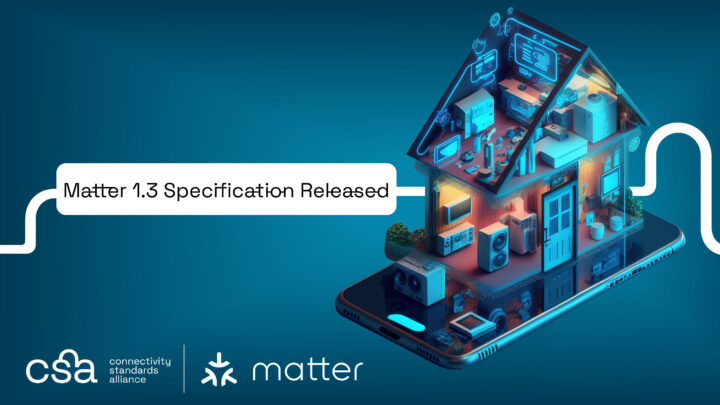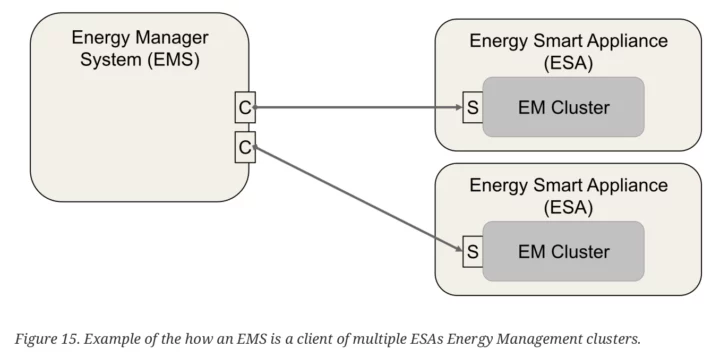The Connectivity Standard Alliance (CSA) has just announced the release of the Matter 1.3 specification and SDK with energy reporting, support for water and energy management devices, electric vehicle chargers, several new “major appliances”, namely various kitchen appliances and laundry dryers, and various other features.
As a reminder the Matter protocol was initially introduced several years ago under the name Project CHIP to improve the interoperability of Smart Home devices from various vendors, so for example, users could connect a Matter-compatible Philips Hue light bulb to a Samsung gateway, or a white-brand Matter sensor with Google Home, etc… Matter started to pick last year with several products launched, and Paisit notably reviewed the MINI Extreme Wi-Fi Smart Switch (MINIR4M), the first Matter device from SONOFF, last October. Matter 1.3 adds various new capabilities and devices.

Matter 1.3 highlights:
- Support for Water and Energy Management Devices
- Energy Management – Matter 1.3 adds support for new energy reporting capabilities. This enables any device to report actual and estimated measurements, including instantaneous power, voltage, current, and others, in real-time, as well as its energy consumption or generation over time.
- Electric Vehicle Charging – Matter 1.3 enables new energy-centric devices starting with “Electric Vehicle Supply Equipment” (EVSE). EV charging equipment manufacturers can now offer consumers a way to better control how and when they charge their vehicles. Users can manually start or stop charging, adjust the charging rate, or specify how many miles or kilometers of range to be added by a set departure time. The charging station would then optimize the charging to occur at the cheapest and lowest carbon times.
- Water Management – Support for leak and freeze detectors, rain sensors, and controllable water valves.
- The following Major Appliance Types are added
- Microwave Ovens – Users can control the cooking time, power level, and mode of operation and receive notifications, such as “end of cycle” or “food ready” when the microwave completes operation.
- Ovens – This enables the configuration of the operational mode (standard, convection bake, roast, steam, broil/grill, proofing) and temperature control, and users can receive notifications such as preheating and target temperature achieved.
- Cooktops — Similar to above.
- Extractor Hoods (Cooker Hoods, Vent Hoods) — Users can control the light and fan settings and receive notifications about the status/end-of-life of any filter material used such as HEPA filters.
- Laundry Dryers — Matter 1.2 added support for laundry machines, so it should come as no surprise that the new Matter 1.3 specification adds support for laundry dryers, enabling users to set the dryer mode and target temperature and remotely start and stop the dryer (depending on local safety regulations). Users may also appreciate notifications such as “end of cycle” and alarms on error states.
- Improvements to Matter Casting Media Players and TVs – Matter 1.3 adds push messages and dialog support for new ambient experiences, casting initialization enhancements, expanded interactivity options for TV apps, text and track support, and improved search functionality. Other Matter devices can now also send notifications to TVs or other devices with displays (for instance to notify that a robot vacuum is stuck, the laundry is done, and so on)
Matter 1.3 also implements various other user experience enhancements and new features for developers such as improved network commissioning through WiFi bands and Thread version/features reporting. You’ll find the full list of changes in the announcement.

At least four documents are part of the Matter 1.3 specification:
- Matter 1.3 Core Specification
- Matter 1.3 Application Cluster Specification
- Matter 1.3 Device Library Specification
- Matter 1.3 Standard Namespace Specification
These are available from the download page, but require your full name, company name, and email address. I’m not sure why they are doing this, as you’ll receive the email immediately without human moderation… The Matter 1.3 SDK can be found on GitHub in the usual “connectedhomeip” repository.
Thanks to TLS for the tip.

Jean-Luc started CNX Software in 2010 as a part-time endeavor, before quitting his job as a software engineering manager, and starting to write daily news, and reviews full time later in 2011.
Support CNX Software! Donate via cryptocurrencies, become a Patron on Patreon, or purchase goods on Amazon or Aliexpress




